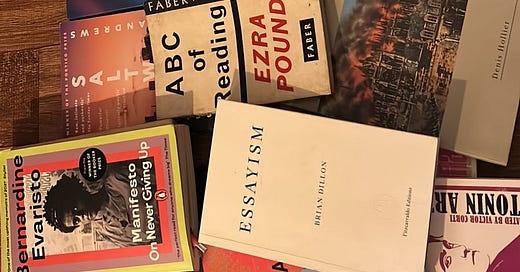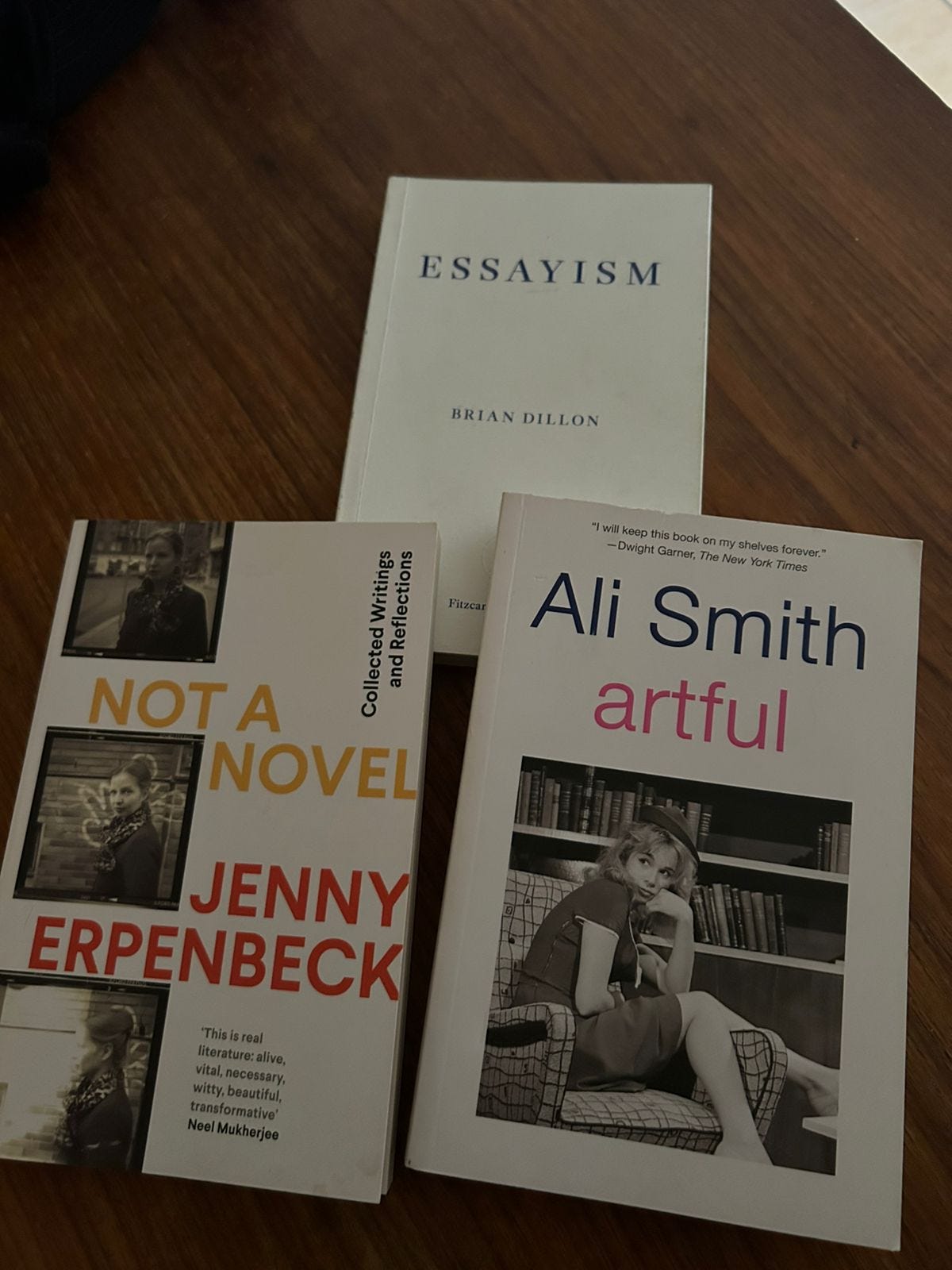Writing as a process: Why are We constantly on the tenterhooks about writing?
I believe that seeing writing as an integral part of language acquisition challenges the trappings of writing mediations....
As I have explored in my Substack, writing may incite irruptions and desubstantialization of language, as writing argues for the continuity of form and meaning across aesthetics and the general saturation of our writing culture.
Admittedly, I have waxed lyrical and philosophical about the increasingly homogeneous status of English in a constant and continuous loop of deformatted genre, and its volatile nature when it comes to speakers' backgrounds and context. The object of this engineered microorganism is, by a long chalk, the networked relations between language and its production, that is to say, writing and speaking.
In this line of thinking, seeing writing as an integral part of language acquisition challenges the trappings of writing mediations, and, as a result, it creates avenues for creativity and self-expression. Although I have always been a good sport about expressing my ideas and learning from essays and other text genres, I used to be on tenterhooks whenever someone uttered the word "writing". Tellingly, I wonder whether it became something ingrained in our very idea of exam format and the fear of being tested.
The most detrimental part of it is the vicious cycle of feeling insufficient and the unremitting sensation that I was never going to live up to people's expectations. That goes without saying, by "people's expectations” I actually mean the unrealistically high expectations I harbored myself. On top of that, my neurotic mentality made me fall prey to the traps of comparison, and to top it off, I was juggling personal and professional life – navigating the choppy waters of a Master's degree and going through an emotional turmoil in my life. This was, by a long chalk, the perfect recipe for disaster.
After several setbacks, it dawned on me that I was all over the shop and completely out of whack – a sort of discombobulation – and it was high time I carved out time for myself and found coping strategies to comprehend the scale of the problem I was entangled in. Truth be told, it went beyond the realm of possibility, and what was merely a writing issue, or nothing untoward, turned out to be a hubbub of voices in my head telling me to give up on becoming a better teacher.
In this context, the mere act of writing became a sort of daily grind, as though I would never be entitled to craft my texts as part of an experimental exercise or even an art expression. Without a shadow of doubt, this is a feeble idea, and the structure ingrained in this perilous line of thinking is rather flimsy. But the nuts and bolts of the issue are that I had always envisioned the day I would finally write a paper akin to the ones I used to read for exam preparation. To be honest, I had never entertained the idea of writing as a commodity – as though I should enhance my skills so that I could sell a high-end, top-notch product to my clients.
After a heated, contentious conversation with a friend of mine, which served as a rude awakening to reality, the stark reality was that I had actually spent years thinking that nothing would blot my copy, not even a piece of poor writing, if that was the case. So WHY was I way too concerned and always on tenterhooks about my writing? Just irrational, I suppose.
Not until I revamped my writing style and varied the sources of reading materials I consumed did I realise that I actually sat at a completely opposite side of the spectrum: I needn't have sided with the idea that there was a perfect, neatly fit writing format for me or any other kind of rule I had to conform to. Indeed, literature and theory had always gone against this tide of utilitarian and unrealistic standards. It was about time I took a leap of faith and jumped at the chance of writing for myself.
In order to have a go at this brand new way of writing, I decided to seek help and reached out to a qualified, experienced language tutor. From that day on, we have been meticulously working on my writing, but through a de-substantialised, de-automatized way, indulging ourselves in experimentation. Journaling, as a matter of fact, played a vital role in helping me adopt a more personal and organic approach to writing, by embracing the inaccuracies and mistakes I have made along the way.
I have imbibed varied content from sources I had never thought I would: from literature to architecture. I devour every bit of text I come across and that appeals to me. I have also learned how to listen to my colleagues more attentively, noticing the way they deploy words and rephrase their sentences. Arguably, reading, listening, and writing are, by nature, intertwined in the same process, and this took me ages to realise and come to terms with my own limitations. By limitations, I definitely mean my inability to perceive the surroundings and the whole atmosphere embedded in my personal and professional ecosystem.
This is, to some extent, a shift in perspective and a revamped way of capturing the world – something akin to a more sensitive state of mind. From a professional standpoint, literature was key to guiding me through the way, providing me with a toolkit of language patterns and disruptive ideas to let my mind wander and savour the thrill of experimentation. I began to notice how ideas are worked out and what happens on a deeper level when our minds are processing and digesting information before it comes to a more tangible and palpable material in the form of words.
Tacitly, nobody cultivates an idea growing in the head until the form flourishes, and the process of penning our thoughts through words may trouble the very process of self-perception, as there is every likelihood that our ideas may get all tangled up along the way. Tellingly, a lot of effort is required to get your writing off the ground, and I am a firm believer that a shift in perception and paradigm is pivotal in revamping our attitude toward language and its thoroughgoing transformation.
In this sense, the advent of writing platforms, such as Substack and other blogs, may be a powerful ally in turning things more palatable and tangible—mainly in the process of understanding that writing is neither an extension of language nor a final product, but rather the core of language.
Without a shadow of doubt, the agility and precision that come with writing come at the cost of waging a battle against the dominant style that tilts toward the figurative, the concrete, the objective, and the monochromatic world of plastic perfection.
Having said that, how would Substack be an ally in allaying our fears and boosting our confidence? Well, in my experience, Substack comes in handy for this shift in mindset, when the excruciating act of transforming our abstract and the hotchpotch of entangled ideas into readable and intelligible arguments begins to be perceived as a pleasant activity: like savouring a balmy evening in the companionship of your thoughts, exceeding the bounds of social conformations and the plasticity of a knotty bureaucratic style.
While these ideas have been activated over the long arc of contemporaneity, I would refer to the exemplary and lapidary work of Isabela de Freitas Vila Boas about writing, in which she gifts us with a timely reminder that in the beginning of the third millennium, writing is viewed not only as a potential for self-expression, but it touches on the social force of communication.
As a matter of fact, writing and its potential reach surpass the mere idea of a paradigm shift and prompt us to take the brass nerve to confront our concerns and question the reason why we are always on tenterhooks to voice our feelings.
Were I to give my words of endorsement, I would argue that this exercise of putting our ideas on paper should be regarded as a leisure activity—without foisting on us the idea that learning only happens when we imbibe new words or craft flawless pieces of essays that conform to most of the writing rules.
Starting a Substack may not be on the cards, and no one should feel pressured to write under pressure. But I would like to invite you to pick one book from your pile and write some words about it. Kick off this process by striking up a genuine, engaging dialogue with the book, emulating the language and pondering the relevance of its style. I personally fancy the idea of engaging with a book by its cultural, linguistic and philosophical theses: How does this piece of text speak to your social and cultural reality? If you are a teacher, a linguistic analysis would be worth it and appreciated.
In the end, whether or not you are sitting on a proficiency certificate or writing just for the sake of capturing the moment, writing a Substack can definitely be a doorway to make your learning and teaching into a more skills-integrated approach to language.





